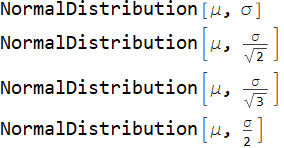As we know, TransformedDistribution can infer a distribution of a transformation like
TransformedDistribution[A*X + B, X \[Distributed] NormalDistribution[μ, σ]]
NormalDistribution[A μ + B, σ Abs[A]]
But can we use it get the sampling distribution of the sample mean? Such as $X_1,X_2,\cdots,X_n \sim \text{NormalDistribution}[μ, σ]$ and then the $\overline{X}=\frac{X_1,X_2,\cdots,X_n}{n}\sim \text{NormalDistribution}[μ, σ/\sqrt{n}]$.
Can we do such symbolic derivation? My current try is
TransformedDistribution[Mean[{x, y, z}], Table[i \[Distributed] NormalDistribution[μ, σ], {i, {x, y, z}}]]
NormalDistribution[μ, Abs[σ]/Sqrt[3]]
I have to say it is not a real symbolic derivation. I hope to get a $\text{NormalDistribution}[μ, σ/\sqrt{n}]$ result. I am not sure I have missed anything.
PS: I mean, I don't want to get the number $3$ in the result. I hope to use $n$ parameters to get $\text{NormalDistribution}[μ, σ/\sqrt{n}]$. The result has that symbol $n$. But I am not sure MMA can do this. Like a real symbolic derivation.


